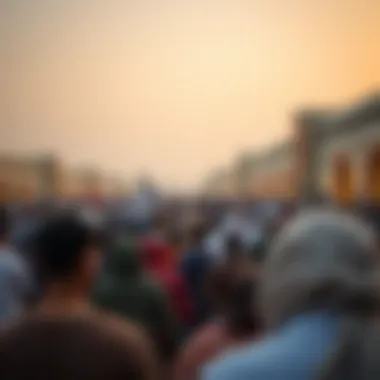Ramadan's Impact on UAE: Culture and Economy


Intro
Ramadan, a month of deep spiritual significance for Muslims worldwide, profoundly affects various aspects of life in the United Arab Emirates. As the crescent moon appears, signaling the beginning of this holy month, the UAE's cities, especially Dubai and Abu Dhabi, transform into vibrant hubs of cultural expressions and communal activities. This transformation extends beyond mere ritual observance; it permeates socio-economic structures, particularly in real estate and retail sectors.
Understanding how Ramadan influences market trends and personal behaviors is crucial not only for residents but also for investors and businesses eyeing opportunities amidst the sacred month. By exploring the dynamics at play, we can uncover unique insights into living and investing during this period, helping to navigate the intricacies introduced by Ramadan. Through this lens, we shall delve into the current market conditions, evaluate growth areas, and propose strategic property investment options tailored to align with the month’s rhythms.
In this exploration, we aim to bridge the gap between faith and commerce, demonstrating how spiritual observances give rise to economic patterns and the potential impacts on lifestyle for everyone engaged in the UAE's fabric.
Market Trends and Analysis
Current Market Conditions
The commencement of Ramadan notably impacts market conditions across the UAE. Retailers experience a shift in consumer behavior, with increased demand for groceries and prepared meals due to increased family gatherings for Iftar, the evening meal when fasts are broken. Additionally, there's a surge in sales of traditional sweets, dates, and gifts.
Notably, the real estate sector sees a notable trend during this period. Developers often utilize Ramadan as a promotional period, launching sales events and exclusive financing offers. Current statistics indicate that residential lease prices might experience fluctuations, adjusting to the heightened community activities and gatherings.
The demand for serviced apartments and short-term rentals is also expected to spike as expatriates and tourists seek accommodations for iftar gatherings and related events.
"In Ramadan, the community spirit amplifies. Business must adapt to not just sell, but also to serve in a way that resonates with the spirit of giving and togetherness."
Future Predictions and Growth Areas
Looking ahead, the overall sentiment points to continued growth in transactions across the retail space. With a growing population of expatriates, the convenience of delivery services and online shopping may become dominant trends, shifting consumer preferences further.
In the real estate market, specific sectors ripe for growth include:
- Luxury rentals targeting expatriates and tourists
- Commercial spaces catering to Ramadan pop-up events and community markets
- Family residences that support multi-generational living due to community-centric cultural shifts
Seasonal developments, such as themed properties or community centers offering wellness activities during Ramadan, could be areas of profitable investment, appealing to health-conscious residents looking to balance spiritual and physical well-being.
Property Investment Strategies
Types of Properties to Consider
Investors keen on leveraging Ramadan's impact should focus on specific property types. Here are key areas:
- Serviced apartments: With an emphasis on guest experiences during Ramadan gatherings, investing in serviced units can yield profitable returns as demand spikes.
- Family-oriented developments: Properties designed for families are expected to attract buyers or renters looking for community features and shared experiences during Ramadan.
- Commercial real estate: Properties that can host events or community activities can benefit from increased traffic during the month.
Financing Options and Considerations
Investors need to assess their financing strategies in light of Ramadan. Traditional banks and financing institutions often roll out special offers, such as:
- Reduced fees on property transactions
- Offers of flexible payment plans
It's advisable for investors to remain cognizant of the market momentum during Ramadan, making informed decisions based on engagement and trends observed in this unique socio-economic landscape.
In summary, embracing the cultural dimensions of Ramadan while maintaining a focus on strategic investments can provide significant advantages in the UAE's evolving market dynamics.
Understanding Ramadan
Ramadan holds a significant place not only within Islamic tradition but also greatly influences the lifestyle and behavior of millions of people, particularly those living in the UAE. It's not merely about fasting or religious observance; Ramadan encapsulates a whole range of social, cultural, and economic dimensions that are critical to grasping its full impact. Religious adherents and non-adherents alike feel the ripple effects of this month-long observance, making it essential for everyone, especially real estate agents, investors, expatriates, homeowners, and developers, to understand its nuances.
By delving into Ramadan, one appreciates the various elements that come into play, from communal activities that strengthen community ties to the economic shifts that can attract or repel investment in different sectors. It creates a backdrop that can influence behaviors, purchasing patterns, and lifestyle adjustments—key insights for professionals navigating the UAE market. Moreover, recognizing the significance of Ramadan paves the way for greater empathy and camaraderie among diverse populations, fostering an environment where various communities coexist harmoniously.
Historical Context
To truly understand Ramadan, one must first explore its historical roots. The practice originated within the early days of Islam, closely tied to the revelation of the Qur'an to Prophet Muhammad. The month of Ramadan serves as a commemorative period for this event, thus establishing its deep connection to spirituality and reflection. Historically, fasting has been a practice found across various cultures and religions, but in Islam, it takes on a layered significance.
In the UAE, like in many other countries, Ramadan has evolved but remains staunchly rooted in its traditions. The collective memory of the community contributes to how Ramadan is observed today. It reflects not only individual devotion but also the cultural identity of the Emirates, blending age-old practices with modern-day conveniences.
Religious Significance
The act of fasting during Ramadan, known as sawm, is one of the Five Pillars of Islam, underscoring its foundational importance to the faith. For many Muslims, Ramadan is not just a time to abstain from food and drink; it’s a month of heightened spiritual awareness, prayer (salah), and community. The fasting day begins at dawn and ends at sunset, symbolizing self-discipline and empathy towards those less fortunate.
During this month, Muslims engage in nightly prayers, known as Taraweeh, where long portions of the Qur'an are recited. This practice aims to foster a deeper connection with one's faith, promoting introspection and growth. The spiritual benefits often lead to an overall sense of unity, community, and shared purpose that extends beyond the individual, tying back to the greater body of Muslims around the globe.
Ultimately, understanding the religious significance of Ramadan provides crucial context for apprehending its implications across various sectors, including real estate, retail, and community dynamics.
"Ramadan is a time to purify the soul, refocus attention on God, and practice self-discipline."
Understanding these facets allows professionals in the UAE to better navigate the demands and expectations that arise during this time.
Ramadan Calendar and Observance
The observance of Ramadan in the UAE holds significant weight not just spiritually but also culturally and socio-economically. Understanding the intricacies of the Ramadan calendar is essential for grasping how this holy month shapes various aspects of life, including individual routines and larger business practices. Ramadan isn't merely a month of fasting; it is a time when the community's rhythm changes, which directly affects sectors such as retail, hospitality, and even real estate.


Lunar Calendar Impact
Ramadan's timing is dictated by the sighting of the new moon, placing it within the Islamic lunar calendar. This creates a unique cadence that shifts every year, moving approximately 10 to 12 days earlier each cycle. With this oscillation, stakeholders and the community have to continuously adapt.
- Flexibility Required: As Ramadan dates are not fixed, businesses and individuals must remain fluid, planning for changes in operating hours, stock, and services offered. For instance, traditional iftar meals are prepared in abundance, requiring suppliers to adjust their delivering schedules to accommodate increased demand.
- Variety of Observance: Different communities may observe this lunar calendar in varying ways, leading to a rich tapestry of customs within the UAE. Expats might celebrate Ramadan differently, reflecting their home countries' practices. Thus, understanding these differences is vital for businesses wanting to connect with their diverse clientele effectively.
Start and End Dates
Determining the exact start and end of Ramadan requires keen observation. As the crescent moon's reappearance marks the beginning of fasting, it can be a time of uncertainty leading up to the official announcement. This practice is deeply rooted in tradition and adds a layer of excitement and anticipation.
"The beginning of Ramadan is seen not just as a date but as a significant moment for spiritual reflection and community engagement."
- Timing Challenges: Both technology and traditional methods coalesce during this period. Companies must prepare for last-minute schedule adjustments. For instance, if a company rolls out promotions for Ramadan, being prepared to pivot quickly is crucial depending on when the month begins.
- Investors' Perspective: For real estate investors, knowing these dates is essential. Understanding when families might be more focused on charitable giving during Ramadan can provide strategic insights into the types of properties that might be more desirable during this time.
Understanding the Ramadan calendar and its observance is not just about knowing when this holy month begins and ends; it is diving into how these dates influence daily life in the UAE, from business operations to community interaction. By recognizing these nuances, stakeholders, expatriates, and residents can navigate the complexities of this sacred month with a more profound respect for its significance.
Cultural Practices During Ramadan
The month of Ramadan brings with it a tapestry of cultural practices that are deeply interwoven into the fabric of life in the UAE. These traditions not only enhance the spiritual experience of fasting but also serve to unite communities in shared values and activities. Understanding these cultural nuances is crucial for anyone looking to grasp the significance of Ramadan beyond mere observance of fasting.
Iftar Traditions
Iftar, the meal that breaks the fast at sunset, holds a special place in Ramadan celebrations. It’s not just about refueling the body after a day spent in fasting; it’s a moment of connection. Families, friends, and neighbors gather to share meals, creating an atmosphere of warmth and community. Traditional dishes often make an appearance, such as dates, which are a must-have to break the fast, and soup, which helps ease the stomach after hours without food.
Here’s a glimpse of what one might find on the table:
- Harees: A blend of wheat and meat, this dish provides a hearty option.
- Luquaimat: Sweet dumplings drizzled with date syrup, a must for dessert lovers.
- Stuffed vine leaves: A savory option that adds variety to the meal.
Beyond the food itself, the timing and manner of Iftar can vary among families. Public gatherings offer a unique chance for expatriates and locals alike to mingle. Many hotels and community centers host large Iftar buffets, catering to diverse palates and dietary needs. It is customary for non-Muslims to be invited to partake in Iftar meals, fostering a sense of cross-cultural camaraderie.
It's not just the food that enriches Iftar; it’s the ritual of coming together. The calls to prayer echo throughout neighborhoods, and the atmosphere buzzes with excitement and anticipation. Each Iftar is an opportunity to reflect on gratitude and generosity, emblematic of Ramadan’s deeper teachings.
Community Engagement
Engagement within the community is palpable during Ramadan, transcending mere social interactions to create a sense of belonging. One notable aspect is the many charity initiatives that bloom during this holy month. Under the principles of Zakat (charitable giving), many individuals and organizations boost their contributions. Communities rally to support not just those in need but also to fund various local projects and services.
Local mosques often serve as hubs for organizing these efforts, acting as facilitators for food drives or distributions that support the less fortunate, a practice that is encouraged and celebrated. Engaging in volunteer programs is in vogue during this period, as individuals seek to make a positive impact on the lives of others. From helping with meal preparations to distributing food packages, the spirit of giving elevates community ties.
“Ramadan isn’t just about abstaining from food; it’s about fostering connections and uplifting those around you.”
Additionally, the month often sees cultural festivals, showcasing traditional arts and crafts. These events provide an avenue for artists and creators to share their work, allowing residents to appreciate and explore the artistic talents flourishing in the UAE. Families can often be found enjoying arts and crafts workshops, storytelling sessions, and cultural performances in various community centers.
As a whole, the cultural practices observed during Ramadan in the UAE reflect a rich blend of spiritual significance and community cohesion. Recognizing these elements is essential for anyone—whether local or expat—who wishes to navigate the nuances of living in this vibrant society during one of its most important months.
Economic Implications of Ramadan
Understanding the economic implications of Ramadan is crucial, as this holy month doesn't just hold spiritual significance; it also brings considerable effects on various sectors. In the UAE, where the observance of Ramadan is deeply rooted in cultural practices, the financial landscape transforms dramatically. Businesses tailor their operations to cater to the unique demands of the season, and this adjustment creates opportunities and challenges alike.
Impact on Retail
Retailers in the UAE leverage the Ramadan spirit, seeing it as a prime opportunity to boost sales through tailored marketing strategies. During this month, many businesses shift their focus to catering to the needs of fasting customers, who seek to break their fast with lavish Iftar meals. This creates a surge in demand for food products, particularly dates, sweets, and traditional dishes.
Moreover, shopping malls and local markets often extend their operating hours to accommodate the bustling activity that follows sunset. Promotional offers and discounts become the order of the day, aiming to attract customers eager to indulge after a day of fasting.
Surveys show that consumers are more willing to spend during Ramadan, and this trend becomes evident through increased foot traffic in stores. Retailers that successfully customize their strategies to align with these behaviors typically see a substantial increase in revenue. In fact, it's not uncommon for sales to rise by 30% or more during this period compared to a regular month.
- Key insights for retailers during Ramadan:
- Focus on food items, especially for Iftar.
- Consider extended shopping hours.
- Implement targeted marketing strategies that reflect local customs and traditions.
Effects on Hospitality Sector
The hospitality industry experiences a remarkable shift during Ramadan. Hotels and restaurants often revamp their menus to include special Iftar and Suhoor offerings. This change not only aims to attract local residents but also caters to tourists looking for authentic culinary experiences.
"Ramadan serves as a catalyst for hospitality businesses, turning typical dining establishments into vibrant epicenters of cultural exchange and community bonding."
Iftar buffets in hotels become immensely popular, drawing crowds that seek social interaction and the essence of community. Increased occupancy rates in hotels during Ramadan reflect the pull of festive atmospheres created by elaborate decorations and themed events.
- Notable impacts on the hospitality sector include:
- Surge in reservations for Iftar and Suhoor.
- Special events such as Ramadan tents and celebrations.
- Enhanced collaboration with local businesses to promote community spirit.
Despite the positives, establishments must also contend with challenges. Adjustments in operating hours and staff scheduling can strain resources. Continuing to uphold high service standards during this busy period is imperative for maintaining a good reputation among patrons.
Understanding these economic implications helps stakeholders assess the potential benefits and challenges associated with Ramadan. The month acts as a litmus test for businesses, wherein aligning their strategies with cultural values can pave the way for long-term success.


Ramadan's Influence on the Real Estate Market
Understanding the impact of Ramadan on the real estate market in the UAE is pivotal for those in the sector. This month-long period not only shapes cultural practices but also affects economic behavior and market dynamics. Investors, developers, and tenants alike must navigate a unique landscape influenced by observance intricacies. This section delves into two significant components: shifts in tenant behavior and investment opportunities arising from the changes that Ramadan brings.
Shift in Tenant Behavior
During Ramadan, the behavior of tenants can shift dramatically. Families often seek larger accommodations to accommodate gatherings for iftar, the evening meal breaking the fast. This creates a noticeable uptick in demand for spacious apartments and villas.
The month prompts many expatriates and locals to reconsider their living arrangements, often leaning towards communities that feature amenities catering to Ramadan needs, such as communal spaces for evenings or access to nearby mosques.
Factors influencing tenant behavior during Ramadan include:
- Community Cohesion: Tenants prefer areas that offer a strong sense of community, particularly places with community events during Ramadan.
- Accessibility to services: Proximity to grocery stores and services relevant for iftar preparations becomes a deciding factor.
- Rental incentives: Landlords might adjust rental terms, introducing special offers to attract tenants during this period.
These changes can create a dynamic rental market, with landlords needing to be adaptive and responsive to the evolving needs and preferences of renters throughout Ramadan.
Investment Opportunities
Ramadan can also unveil unique investment opportunities in the real estate sector. For investors, recognizing the fluctuations in tenant demand can open doors to lucrative ventures. Historically, this period can witness increased interest in short-term rentals, particularly in vibrant areas around malls, parks, and cultural sites.
Key considerations for investors include:
- Market Adjustments: Understanding that rental rates may plateau or slightly rise due to heightened demand for temporary accommodations.
- Diversified Offering: Presenting varied property types, be it furnished short-term leases or long-term agreements, can cater to diverse tenant needs.
- Community Projects: Engaging in developments that focus on community-centric designs could attract investments, as they align with the communal spirit prevalent in Ramadan.
Ramadan doesn't simply represent a time for the faithful; it's an opportunity for real estate professionals to rethink strategies, cater to evolving tenant needs, and tap into the communal essence that characterizes the month.
Community Initiatives During Ramadan
The significance of community initiatives during Ramadan cannot be overstated. In the UAE, the month is not only a time of personal spiritual reflection but also a period that fosters community ties and strengthens social responsibility. Various activities that unfold during this holy time play an immense role in promoting unity, understanding, and camaraderie among residents and citizens. The collaborative spirit shines bright as people come together to support one another, reinforcing the notion that practiving charity is as crucial as fasting itself.
Charity and Giving
During Ramadan, charity assumes a central role. The cultural ethos encourages individuals to open their hearts and wallets, contributing to a myriad of charitable causes. The months leading up to Ramadan often see an uptick in campaigns aimed at raising awareness about the importance of giving back.
In the UAE, organizations like the UAE Red Crescent and many local charities host events that invite people to contribute non-perishable food items, clothes, and financial support. Here's a snapshot of how charity manifests during this month:
- Food Drives: Supermarkets and community centers become collection hubs for fooditems, ensuring that families in need can break their fast with dignity.
- Fundraising Events: Local businesses often hold charity galas or auctions, with proceeds going to essential services like healthcare or education.
- Sponsorship of Iftar Meals: Many initiatives organize mass Iftar gatherings, where anyone, regardless of background, can enjoy a meal together.
The implications of these charitable acts extend beyond immediate relief; they create a sustainable model of support that resonates throughout the community, instilling values of empathy and togetherness.
Volunteer Programs
A natural extension of charitable giving is the rise of volunteerism during Ramadan. Many residents, inspired by the spirit of the month, engage in various forms of volunteer work. This is vital not only to address immediate community needs but also in fostering long-term relationships among diverse groups.
Several organizations facilitate volunteer programs, catering to individuals of all skill levels. They might involve:
- Food Preparation: Volunteers often gather to prepare meals for community Iftars, fostering a sense of shared purpose.
- Coordinating Events: Many locals chip in to help run activities like cultural exhibitions or children's events designed to celebrate Ramadan’s values of patience and gratitude.
- Community Clean-Ups: As a sign of respect for the holy month, communal efforts often organize clean-up campaigns, ensuring that public spaces reflect the spirit of Ramadan.
As highlighted by one participant, “It’s truly fulfilling; through these efforts, you see firsthand how a little bit of time spent volunteering can create a ripple effect of goodwill.”
By engaging in these initiatives, volunteers not only serve the community but also receive the profound benefit of connection and purpose, enriching their own lives in the process.
The combination of these charitable efforts and volunteer programs demonstrates the depth of community engagement during Ramadan in the UAE, creating a robust framework for social support and benevolence that often extends beyond the holy month.
Challenges Faced During Ramadan
As Ramadan approaches, various challenges emerge that affect both daily life and business operations in the UAE. Recognizing these challenges is crucial, especially for real estate agents, investors, expatriates, and homeowners, as they navigate this month of fasting and reflection. Understanding the implications of these challenges can help prepare individuals and businesses alike, ensuring they can adapt effectively during this sacred time.
Supply Chain Adjustments
During Ramadan, the flow of goods and services is often disrupted. Suppliers must adapt to increased demand for certain items, particularly food. It's not just about more people wanting to eat; the customs around Iftar lead to a spike in shopping behavior around sunset.
Key considerations include:
- Inventory Management: Retailers need to ensure they have enough stock of popular items, especially dates and traditional food products.
- Delivery Challenges: With increased demand, delivery services may experience delays, making it crucial for businesses to communicate effectively with customers. Preparing ahead can mitigate these issues.
- Product Availability: Many suppliers enhance their offerings with seasonal promotions, which can lead to complexities in managing product lines.
In terms of logistics, transportation companies often adjust their schedules to accommodate altered hours and high demand, making it imperative for businesses to rethink their distribution strategies.
"Adjusting operational flow is not just necessary; it’s crucial for maintaining customer satisfaction during this busy period."
As a real estate investor or a business owner, staying ahead of these adjustments can directly impact profit margins. Adaptability is key.
Adapting Business Hours
The working hours during Ramadan differ from regular times. For instance, many businesses operate on reduced hours, while some switch to later opening times, culminating in prolonged evenings. This shift can lead to significant implications for both employees and customers.


Impact on businesses includes:
- Customer Engagement: Businesses that are mindful of Ramadan's unique rhythms may find that customer engagement shifts mostly to evening hours, creating a need for promotional events or special deals during Iftar.
- Employee Well-being: With changes in work schedules, companies must be sensitive to employees’ well-being, ensuring that the adjustments accommodate fasting needs while still maintaining productivity.
- Workplace Culture: Businesses can foster a supportive culture by recognizing Ramadan's significance, such as providing flexible working options or allowing for breaks specifically designed for prayers or meals.
With a careful strategy in place, both employees and customers can navigate these changes smoothly. Real estate agencies should ensure that they align their operations accordingly, maintaining a seamless service experience during this busy month.
Lifestyle Adjustments During Ramadan
During Ramadan, individuals are not just observing a spiritual practice; they are also navigating a host of lifestyle adjustments that influence their daily lives. These changes are profound within the UAE context, where societal norms honor and respect the traditions surrounding this holy month. Understanding these adjustments is crucial as they reflect on the behaviors of residents and the atmosphere in business and community environments.
Changes in Daily Routines
The rhythm of life during Ramadan can shift dramatically. As the sun rises, daily routines are often altered to accommodate the pre-dawn meal known as Suhoor. This meal is critical as it's the last opportunity to eat before the fast begins at dawn. For many, it means rising earlier, which can disrupt normal sleep patterns. Some individuals find themselves trading early morning meetings for late-night iftars, shifting social calendars in the process.
In businesses, adjustments are afoot as well. Operating hours can vary significantly. Shops may open later and stay open until the early hours of the morning, inviting footsteps from those eager to break their fast or seek out entertainment. Employees might find their workdays compressed to accommodate the fasting hours and evening gatherings which follow.
This mosaic of early mornings and late evenings can create a vibrant yet exhausting pace, as the community comes together to celebrate with family and friends. Observers report that this change even brings about a heightened sense of community, as people bond over shared experiences of fasting and feasting.
Health Considerations
Fasting during Ramadan is more than a mental challenge; there are notable health implications to consider. The sudden shifts in eating patterns can lead to various physical responses. Although many approach Ramadan with the intent to engage in healthier eating, the reality often presents its challenges. Consuming large meals after sunset can lead to digestive discomfort or fatigue.
It is essential for individuals to focus on balanced nutrition during Iftar, avoiding excessive oily and sugary foods. Hydration is equally important, thus filling the glass with plenty of water post-fast becomes a priority. Having a balanced meal, rich in vegetables, whole grains, and proteins, can mitigate risks of fatigue and maintain energy levels throughout fasting hours.
Moreover, engaging in moderate physical activity, like evening walks, can help balance the energy intake and support the body's metabolism during this demanding month. Trying to maintain regular health check-ups—especially for those with pre-existing conditions—becomes paramount during Ramadan, ensuring that the fasting period does not lead to complications.
"The awareness during Ramadan extends beyond spirituality; it encompasses a holistic approach to health and well-being."
Individuals living in the UAE during Ramadan share experiences that highlight the adaptive skills needed in their eating habits, sleep schedules, and community interactions. By prioritizing health and sensible adjustments, residents navigate the month with grace and resilience, underscoring the rich tapestry that is Ramadan in the UAE.
Observance of Ramadan in Dubai
The observance of Ramadan in Dubai holds a special place, as it serves not just as a month of fasting but also a time for community bonding and cultural expression. Each year, the city transforms into a vibrant hub of spiritual and communal activities that reflect the rich Islamic heritage and the modern lifestyle of its residents.
During this sacred month, it’s common for people to witness an increase in charitable activities. The local community engages in various initiatives aimed at helping those in need. This aspect often highlights the spirit of generosity which is at the heart of Ramadan, and it is something particularly important in the UAE’s multicultural fabric.
Local Events and Festivals
Local events and festivals throughout Ramadan contribute to the sense of unity in Dubai. As sunset approaches, the city's atmosphere becomes electrifying. The sights and sounds of iftar events erupt across the skyline, where restaurants and hotels host elaborate feasts tailored for breaking fast. Notable venues like the Burj Al Arab and the Dubai Mall pull out all the stops, creating experiences that intertwine culinary excellence with cultural authenticity.
Moreover, several organizations take the initiative to host Ramadan bazaars, where attendees can explore unique handcrafted goods and savor traditional delicacies. These events not only provide opportunities for local artisans to showcase their work but also promote cultural exchange among residents and tourists.
"Ramadan is a month that brings everyone together, breaking food and cultural barriers," emphasizes Mr. Al Mansoori, a local event organizer.
In addition to food festivities, various art exhibitions and cultural performances take place during this time. Events like the Dubai Ramadan Night Markets allow various artists to showcase their talent, while folk plays and traditional music recitals celebrate the rich cultural heritage of the region. These unfold in public spaces and parks, making them accessible for all community members.
Public Gatherings
Public gatherings during Ramadan are essential, as they greatly enhance community interactions. Large open spaces such as Al Seef and Zabeel Park become focal points for these social gatherings. Families often come together to share their iftar meals, creating a lively yet respectful environment. It’s common to see people of all backgrounds engaging,lending a welcoming air to these public festivities.
Additionally, mosques throughout Dubai welcome attendees for Taraweeh prayers, with many services broadcasted live or accessible online. This encourages a sense of communal worship, important in nurturing faith and spirituality among congregants.
There’s also a noticeable uplift in social media activity, with residents sharing their iftar experiences, community events, and charitable initiatives. Expats and locals use platforms like Instagram and Facebook to document their Ramadan journey, attracting wider participation and fostering a cohesive community spirit.
In sum, the observance of Ramadan in Dubai is marked by an infusion of cultural richness, community spirit, and shared experiences. The blend of local events and public gatherings create a dynamic tapestry of traditions, ensuring that the essence of Ramadan is both revered and celebrated across diverse demographics.
International Perspectives on Ramadan
The observance of Ramadan extends beyond the borders of the UAE, weaving together a diverse tapestry of practices and traditions globally. This section illuminates the significance of international perspectives on Ramadan, offering insights into how different cultures interpret and celebrate this sacred month. Understanding these perspectives is crucial for various stakeholders, especially real estate agents, investors, and others immersed in sectors influenced by cultural dynamics.
Comparisons with Other Regions
When examining the nuances of Ramadan across different regions, one can observe a multitude of practices that reflect both local customs and shared Islamic values. For instance, in Indonesia, the largest Muslim-majority country, the start of Ramadan is marked by vibrant local festivities, including the unique prayer traditions in mosques that are often more elaborate compared to other regions. In contrast, countries like Saudi Arabia impose stricter regulations on commercial activities, which can drastically alter shopping patterns and community engagements during this month.
Some key comparisons include:
- Iftar Practices: In Turkey, the breaking of the fast commonly includes communal dinners near mosques, while in the UAE, lavish buffets dominate.
- Public Attitudes: The community's response to Ramadan can vary significantly; in Morocco, for instance, the atmosphere is festive with street celebrations, while in Egypt, there's a more family-centered approach to celebratory practices.
This kaleidoscope of cultural observance provides valuable insights for investors. A real estate developer looking to enter a market may benefit from understanding local expectations and rituals, particularly during Ramadan, to tailor residential projects and community spaces that resonate with cultural values.
Cultural Exchange
Ramadan serves as a pivotal period for cultural exchange, allowing various ethnicities and backgrounds to engage with Islamic traditions meaningfully. In regions where Ramadan is observed alongside a large expatriate population, such as in the UAE, cultural blending is particularly pronounced. Local customs intermingle with those of expatriates, fostering a communal atmosphere marked by mutual respect and shared experiences.
During this month, many non-Muslims participate in Iftar and attend events aimed at promoting intercultural understanding. Establishments like local community centers often host open-house events, welcoming individuals of all faiths to learn about Ramadan practices firsthand. This interaction not only enriches the cultural fabric of the UAE but also aids in forming professional relationships across diverse sectors.
"Ramadan is a time that brings people together; it's a testament to the unity in diversity that we cherish in the UAE."
Ending
In summary, the international perspectives on Ramadan highlight a rich array of practices and traditions influenced by cultural contexts. For professionals in real estate and investments, recognizing these differences can enhance engagement strategies, making them more effective in diverse market environments. The celebration of Ramadan, both locally and internationally, reflects a unifying force that transcends geographical boundaries and emphasizes shared values of community and spirituality.
For further reading on Ramadan practices around the world, you can visit Britannica for in-depth articles and insights.











